Florida Residents Struggle to Afford High Health Care Costs Particularly in Rural Regions
A Range of Healthcare Affordability Burdens
According to a survey of Florida adults, conducted from May 3 to May 23, 2023, respondents living in
rural areas of Florida experience greater health care affordability burdens than those living in non-rural
areas of the state. Seven out of ten Florida adults living in rural counties (70%) experienced one or more
of the following health care affordability burdens in the prior 12 months, compared to nearly six out of ten
(59%) non-rural respondents (see Appendix A).
1) Being Uninsured Due to High Costs
Over half (57%) of respondents living in rural areas cited “too expensive” as the major reason for not
having coverage, compared to 43% of respondents living in non-rural areas, far exceeding other reasons
like “don’t need it” and “don’t know how to get it.”
2) Delaying or Going Without Healthcare Due to Cost
Nearly two-thirds (63%) of rural Florida respondents encountered one or more cost-related barriers to
getting health care during the prior twelve months, compared to 51% of respondents living in non-rural
regions (see Table 1).
Moreover, for both groups, cost was by far the most frequently cited reason for not getting needed
medical care, exceeding a host of other barriers like transportation, difficulty getting an appointment, and
lack of childcare.
3) Struggling to Pay Medical Bills
Other times, Florida respondents got the care they needed but struggled to pay the resulting bill.
In the prior 12 months, four out of ten Florida adults in rural counties (41%) experienced one or more of
these struggles to pay their medical bills, compared to 38% of respondents living in non-rural areas (see
Table 2).
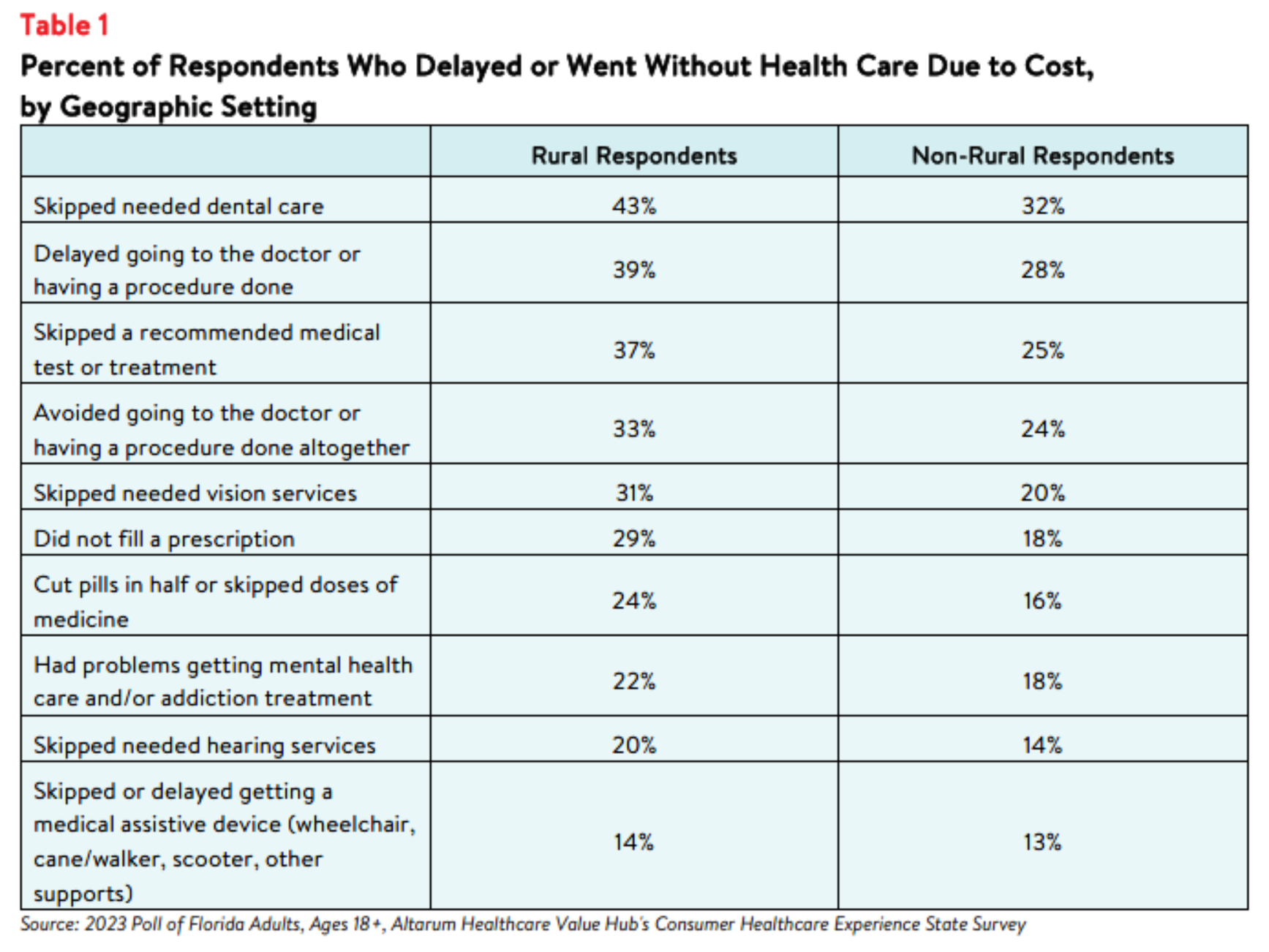
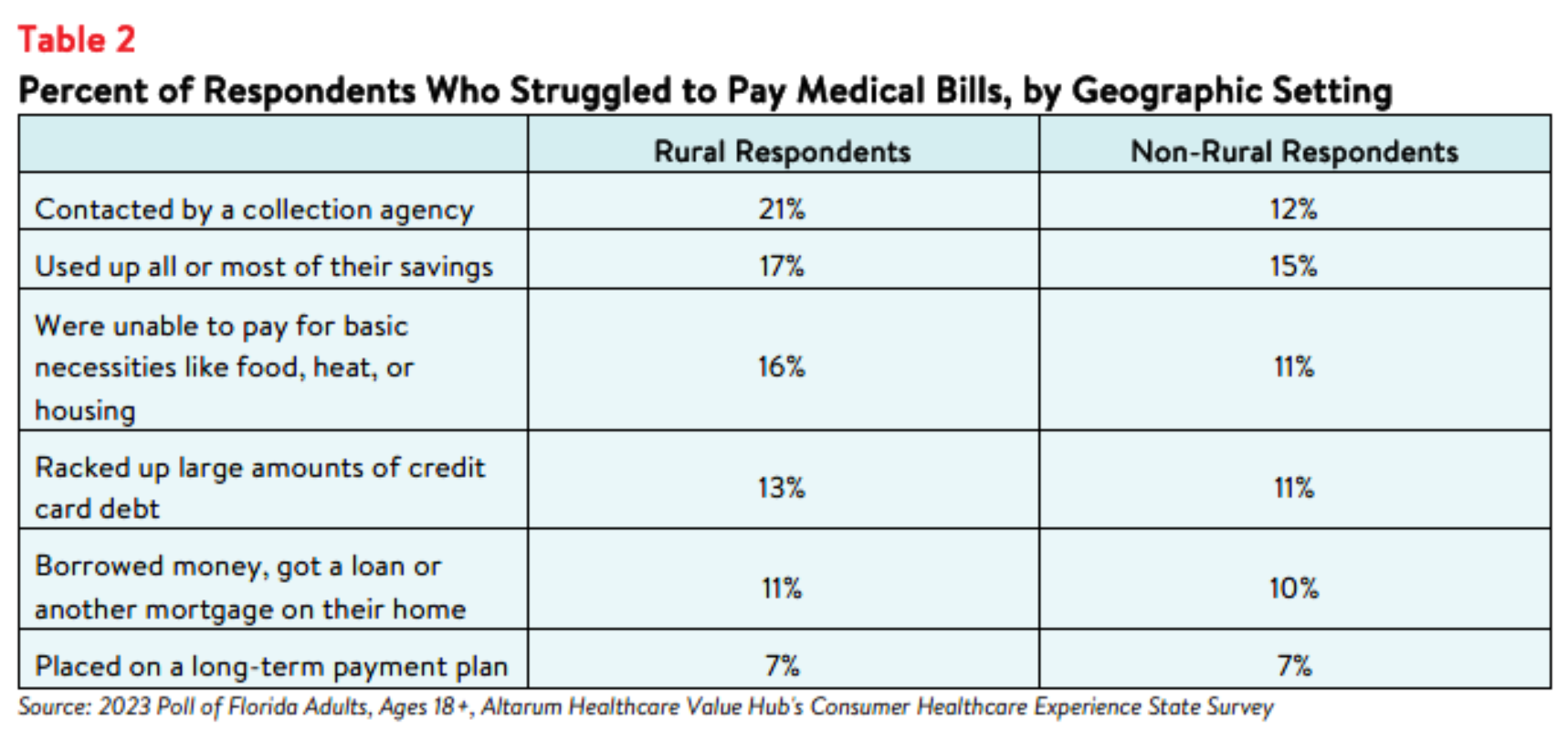
High Levels of Worry about Affording Health Care in the Future
Though respondents living in rural areas reported slightly greater rates of worry, large shares of both rural
and non-rural residents reported worrying about affording health care in the future. Well over three-
quarters of respondents in both rural counties (84%) and non-rural counties (78%) reported being “worried” or “very worried” about one or more of the following topics: affording nursing home and home care services; health insurance becoming too expensive; costs when elderly; cost of a serious illness or accident; cost of needed dental, vision, and hearing care; prescription drug costs; and losing health insurance (see Figure 1).
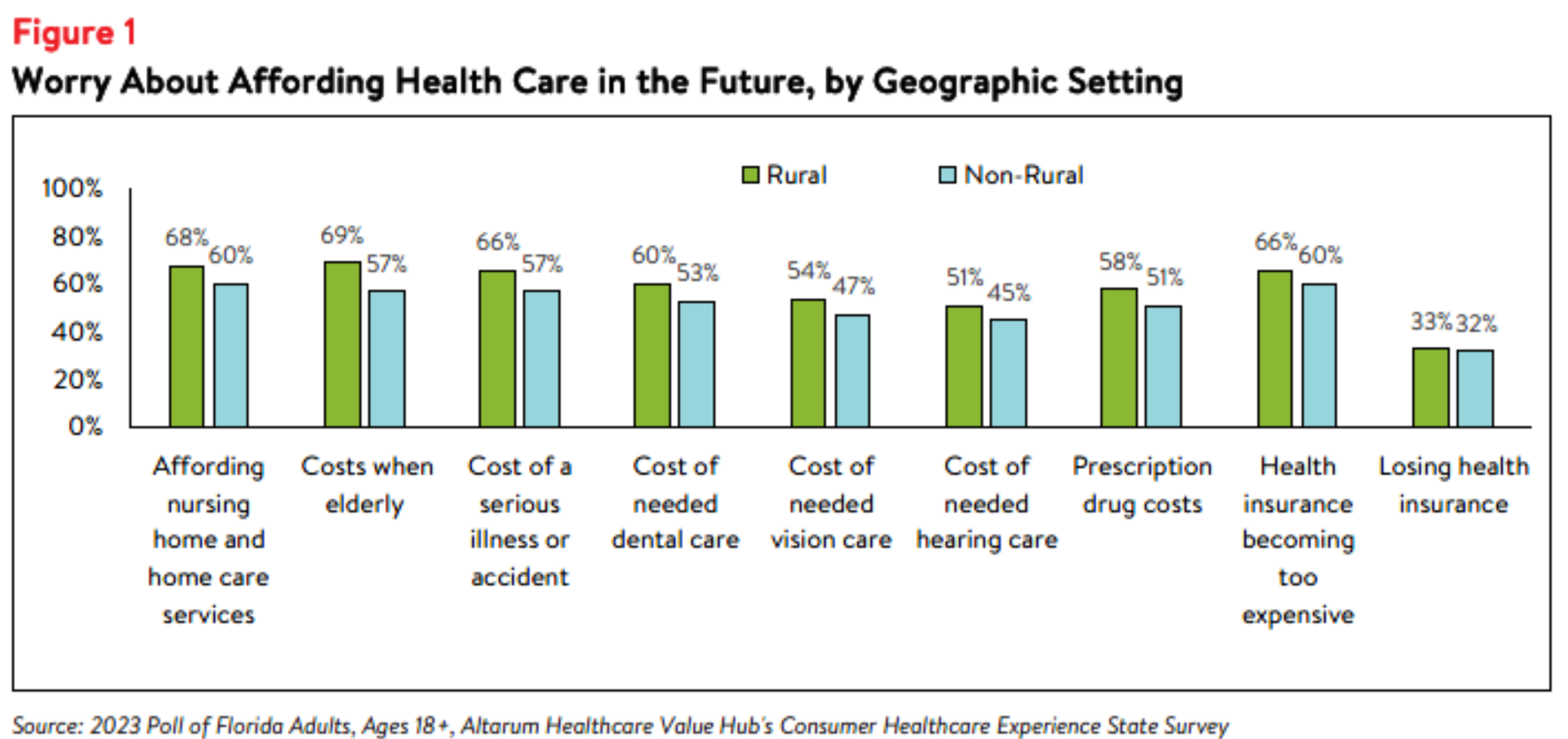
Impact of Hospital Consolidation
In addition to the above health care affordability burdens, 7% of rural respondents and 11% of non-rural
respondents reported that they or a family member were unable to access their preferred health care
organization because of a merger that made their preferred organization out-of-network. When asked
about the greatest burden hospital mergers had created for respondents and their families, the top three
most frequently reported issues were:
- 34%—It created an added financial burden
- 26%—It has created an added wait time burden when searching for a new provider accepting patients
- 21%—It has created a gap in my continuity of care (my former provider knew me and now I have to explain everything again)
Dissatisfaction with the Health System and Support for Change
Florida respondents living in rural areas report greater dissatisfaction with the health system than
respondents living in non-rural areas. Almost three-quarters (74%) of rural respondents agreed or strongly
agreed that “the system needs to change,” and just 21% agreed or strongly agreed that “we have a great
healthcare system in the U.S.,” compared to 65% and 35% of Florida respondents in non-rural counties,
respectively.
Respondents do see a role for themselves in solving problems. They reported actions they have already
taken, like researching the cost of prescription medication, with at least 55% of respondents in both rural
and non-rural counties said they had tried to find the cost of a drug beforehand. They also reported on
actions they should be taking—with 71% of respondents in rural counties and 75% of respondents in non-
rural counties believing that taking better care of their personal health is one of the top things they can
do personally to address affordability.
But, in far greater numbers, they saw a role for their elected representatives to address health system
problems. There is also support for change regardless of respondents' political affiliation (see Table 3).
The high burden of health care affordability, along with high levels of support for change, suggest that
elected leaders and other stakeholders need to make addressing the cost of health care a top priority.
Annual surveys can help assess whether or not progress is being made.
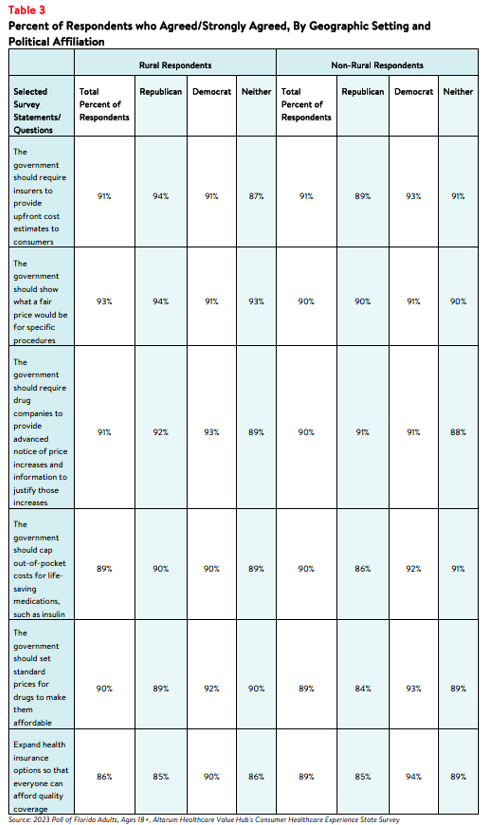
Methodology
Altarum’s Consumer Healthcare Experience State Survey (CHESS) is designed to elicit respondents’ unbiased views on a wide range of health system issues, including confidence using the health system, financial burden and possible policy solutions.
This survey, conducted from May 3 to May 23, 2023, used a web panel from online survey company Dynata with a demographically balanced sample of approximately 1,514 respondents who live in Florida. Information about Dynata’s recruitment and compensation methods can be found here. The survey was conducted in English or Spanish and restricted to adults ages 18 and older. Respondents who finished the survey in less than half the median time were excluded from the final sample, leaving 1,376 cases for analysis. After those exclusions, the demographic composition of respondents was as follows, although not all demographic information has complete response rates:
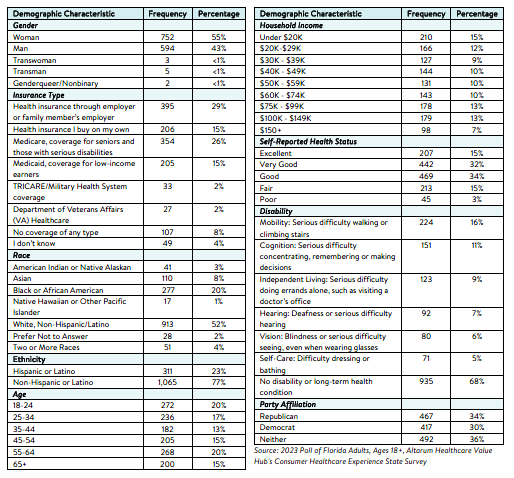
Percentages in the body of the brief are based on weighted values, while the data presented in the demographic table is unweighted. An explanation of weighted versus unweighted variables is available here.
Altarum does not conduct statistical calculations on the significance of differences between groups in findings. Therefore, determinations that one group experienced a significantly different affordability burden than another should not be inferred. Rather, comparisons are for conversational purposes. The groups selected for this brief were selected by advocate partners in each state based on organizational/advocacy priorities. We do not report any estimates under N=100 and a co-efficient of variance more than 0.30.
Appendix A
The state was divided into rural and non-rural regions, by county.
|
Rural |
Non-Rural |
|
Baker County, Florida |
Alachua County, Florida |
|
Bradford County, Florida |
Bay County, Florida |
|
Calhoun County, Florida |
Brevard County, Florida |
|
Columbia County, Florida |
Broward County, Florida |
|
DeSoto County, Florida |
Charlotte County, Florida |
|
Dixie County, Florida |
Citrus County, Florida |
|
Franklin County, Florida |
Clay County, Florida |
|
Gadsden County, Florida |
Collier County, Florida |
|
Gilchrist County, Florida |
Duval County, Florida |
|
Glades County, Florida |
Escambia County, Florida |
|
Gulf County, Florida |
Flagler County, Florida |
|
Hamilton County, Florida |
Hernando County, Florida |
|
Hardee County, Florida |
Hillsborough County, Florida |
|
Hendry County, Florida |
Indian River County, Florida |
|
Highlands County, Florida |
Lake County, Florida |
|
Holmes County, Florida |
Lee County, Florida |
|
Jackson County, Florida |
Leon County, Florida |
|
Jefferson County, Florida |
Manatee County, Florida |
|
Lafayette County, Florida |
Marion County, Florida |
|
Levy County, Florida |
Martin County, Florida |
|
Liberty County, Florida |
Miami-Dade County, Florida |
|
Madison County, Florida |
Okaloosa County, Florida |
|
Monroe County, Florida |
Orange County, Florida |
|
Nassau County, Florida |
Osceola County, Florida |
|
Okeechobee County, Florida |
Palm Beach County, Florida |
|
Putnam County, Florida |
Pasco County, Florida |
|
Sumter County, Florida |
Pinellas County, Florida |
|
Suwannee County, Florida |
Polk County, Florida |
|
Taylor County, Florida |
Santa Rosa County, Florida |
|
Union County, Florida |
Sarasota County, Florida |
|
Wakulla County, Florida |
Seminole County, Florida |
|
Walton County, Florida |
St. Johns County, Florida |
|
Washington County, Florida |
St. Lucie County, Florida |
|
|
Volusia County, Florida |







